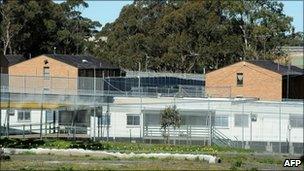Australia to deport first Afghan failed asylum-seeker
- Published

Ismail Mirza Jan is currently being held at the Villawood detention centre in Sydney
Australia is to deport an Afghan man after rejecting his asylum claim - the first time such a move has been taken.
Local media identified the man as Ismail Mirza Jan, 27, and said he would be deported on Saturday.
He is the first person to be repatriated under a deal struck between Canberra and Kabul in January.
Mr Jan says he no longer has family in Afghanistan and will be persecuted because he is Hazara, an ethnic group targeted by the Taliban.
He left Afghanistan in 2001 and arrived by plane in Australia last year, having had applications for asylum rejected in the UK and in Ireland.
He is currently being held in the Villawood detention centre in Sydney.
'No friends, no family'
Australian immigration officials say they are satisfied he can be safely returned to Afghanistan.
"Arrangements have been made for an Afghan male who arrived in Australia on 16 February 2010 to be removed from Australia to Kabul, Afghanistan," the Department of Immigration and Citizenship said in a statement.
"His protection claims have been thoroughly examined by the department, by the refugee review tribunal and the Australian Federal Magistrates' court and he was found not to be a refugee."
The man had been "provided with advice of his removal", the statement said.
Mr Jan told ABC News that he feared for his life because there was no-one to protect him in Afghanistan.
"I have no friends, no family there. So how can I live, relocate in Kabul?" he said.
Ian Rintoul, of Australia's Refugee Action Coalition, said the move set "a dangerous precedent".
Afghans make up the largest number of asylum seekers arriving in Australia. Early this year, the two countries signed a deal allowing for the involuntary repatriation of failed asylum seekers.
Both main political parties are keen to appear tough on border control, but government asylum policy has been in crisis since a court ruled a plan to swap refugees with Malaysia unlawful.
Under the plan, Australia would have sent 800 asylum-seekers who arrived by boat on to Malaysia and would have received 4,000 refugees in return over four years.
But the court ruled that Malaysia - which has not signed UN refugee conventions - did not offer adequate protection.
This has thrown plans to process asylum-seekers offshore into disarray.
- Published2 November 2011
- Published13 October 2011
- Published17 January 2011